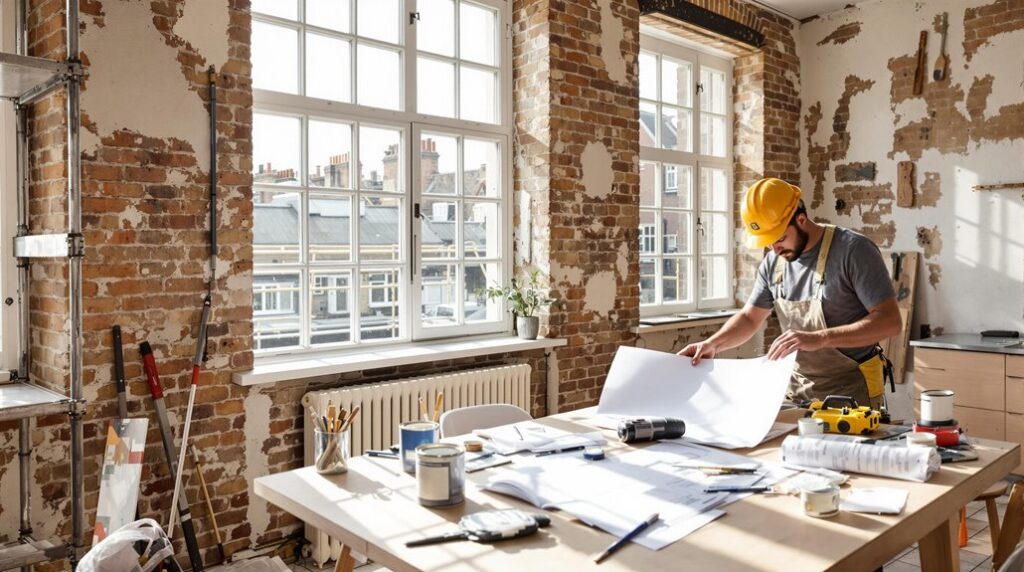I’ve learned that renovating a leasehold flat isn’t as straightforward as owning a freehold property. Your lease agreement contains specific alteration covenants that’ll dictate what you can and can’t do to your home. Some changes require formal consent from your freeholder, while others might be prohibited entirely. Before you pick up that sledgehammer or call any contractors, there’s a vital legal framework you need to understand that could save you thousands in potential disputes.
Key Takeaways
- Check your lease for alteration covenants—absolute, qualified, or consent-required—before planning any structural or non-structural renovations.
- Obtain a formal licence to alter from your freeholder with detailed plans, structural calculations, and compliance documentation.
- Budget £29,675–£42,248 for core renovation costs plus freeholder consent fees, professional fees, and 10-15% contingency for unforeseen issues.
- Secure planning permission and building regulations approval early, as leasehold properties lack automatic permitted development rights.
- Avoid unauthorized alterations to prevent lease breaches, enforcement actions, financial penalties, and potential property forfeiture risks.
Understanding Your Lease Terms and Alteration Restrictions

Before you pick up a hammer or call a contractor, you’ll need to examine your lease agreement carefully to understand what alterations you’re actually permitted to make. Your lease will contain one of three types of alteration covenants that determine your renovation scope.
Absolute covenants prohibit all structural alterations without exceptions. If you’re dealing with qualified covenants, you can typically proceed with non-structural work but must obtain landlord consent for structural changes. Some leases require consent for any alterations whatsoever. It’s also important to be aware of hidden costs that may arise during the renovation process.
The key distinction lies between structural and non-structural work. Structural changes like wall removals or extensions always need formal approval, while non-structural upgrades like kitchen refits may not require consent if your lease permits them. Where landlord consent is required, the landlord has an implied obligation not to unreasonably withhold their approval. Don’t assume anything—verify your specific clauses first.
Securing a Licence to Alter From Your Freeholder
Once you’ve confirmed your lease permits the alterations you’re planning, you’ll need to secure a licence to alter from your freeholder—a formal written agreement that grants specific permission for your proposed improvements. This process protects everyone’s interests by preventing unsuitable changes that could compromise safety or property values. Additionally, it’s important to consider whether your proposed alterations adhere to UK planning regulations, as this may influence the approval process.
You’ll submit detailed proposals including plans, drawings, and structural calculations to your landlord or their surveyor. They’ll assess the impact and decide whether to grant consent. If approved, solicitors prepare the formal licence, which must be executed before starting work.
The licence will specify permitted alterations, timelines, and conditions. It may require you to obtain planning permission, building regulations approval, and adequate insurance coverage first. The licence may also include requirements for property reinstatement to its original condition at the end of your lease term.
Budgeting for Renovation Costs and Professional Fees

After securing your licence to alter, you’ll need to establish a thorough budget that accounts for both renovation work and the professional fees unique to leasehold properties. Core renovation costs typically range from £29,675–£42,248 for a 1-bed flat, averaging £657/m². You’ll also face leasehold-specific expenses including freeholder consent fees (£500–£1,500), building insurance premium increases of 10–20%, and potential service charge adjustments.
Professional fees add considerable costs: architects charge 5–15% of project value, whilst structural engineers cost £500–£1,500 for surveys, which are crucial for assessing structural integrity in the case of subsidence. Don’t forget quantity surveyors (£800–£1,200) and project managers (3–7% of total costs).
I recommend reserving 10–15% contingency for unforeseen issues and remember—all quoted costs exclude 20% VAT, which considerably impacts your final budget. If you’re renovating in London, expect renovation costs to be 15% higher than other regions due to increased labour and material expenses.
Meeting Planning Permission and Building Regulation Requirements
While leasehold properties lack permitted development rights—meaning you can’t rely on automatic approvals for common alterations—navigating the dual requirements of planning permission and building regulations becomes essential for any substantial renovation. I recommend starting with early consultation with local planning officers, especially if you’re in a Conservation Area where heritage impact statements are mandatory. Additionally, be aware that planning permission costs can vary significantly based on your project’s specifics.
For building regulations compliance, you’ll need approved inspectors to verify fire safety, ventilation, and accessibility standards. Structural changes like wall removals require both planning consent and building control approval. Don’t forget Part P certification for electrical work and acoustic assessments for flooring changes.
The sequence matters: secure planning permission first, then building control approval, before starting construction. Building notices allow quicker starts for simple renovations, while full plans applications involve detailed drawings and longer approval times of 5-8 weeks.
Avoiding Legal Consequences of Unauthorised Alterations

Following proper procedures isn’t just about compliance—it’s about protecting yourself from serious legal and financial consequences that can devastate your renovation project and your finances.
When you alter your leasehold property without freeholder consent, you’re breaching your lease agreement. This exposes you to enforcement actions, financial penalties, and potentially forfeiture proceedings where you could lose your lease entirely. Understanding lease terms is crucial in avoiding these risks.
The costs compound quickly: you’ll pay for alterations, mandatory restoration to original condition, legal fees, and possible damages to your freeholder. Courts can issue injunctions forcing immediate work stoppage, while unauthorised modifications complicate future sales by deterring buyers and mortgage lenders.
Your solicitor will flag these issues during conveyancing, potentially killing deals. Even seemingly minor non-structural alterations may still require freeholder consent depending on your specific lease terms. Don’t risk it—obtain proper permissions upfront.
Conclusion
I’ve covered the essential steps for renovating your leasehold flat while staying compliant with UK regulations. You’ll need to review your lease terms carefully, obtain proper licences from your freeholder, budget for unexpected costs, and guarantee you’ve met all planning and building requirements. Don’t risk unauthorized alterations—they’ll create expensive legal problems later. Follow these guidelines systematically, and you’ll navigate the renovation process successfully while protecting your investment and avoiding disputes with your freeholder.
References
- https://www.previewstudio.co.uk/blog/how-to-get-permission-for-your-flat-renovation-even-on-a-leasehold
- https://www.housebeautiful.com/uk/renovate/legal/a22138878/renovating-leasehold-property/
- https://www.squarepointsurveyors.co.uk/blog/what-permissions-do-you-need-to-refurbish-a-leasehold-property/
- https://www.movingandimproving.co.uk/blog/post/5-things-you-need-know-and-do-refurbishing-your-leasehold-flat
- https://osborneslaw.com/blog/internal-structural-alterations-leasehold-property/
- https://www.mishcon.com/news/can-i-carry-out-works-to-my-leasehold-property
- https://www.coles-miller.co.uk/blog/applying-for-consent-for-alterations-to-leasehold-property
- https://www.lease-advice.org/article/consent-to-alterations-improvements-in-a-leasehold-property-what-charges-can-be-justified/
- https://www.kewlaw.co.uk/helpful-guide/tenants-alterations-and-lease-expiry/
- https://legalvision.co.uk/commercial-lease-property/licence-alter-property-modifications/

